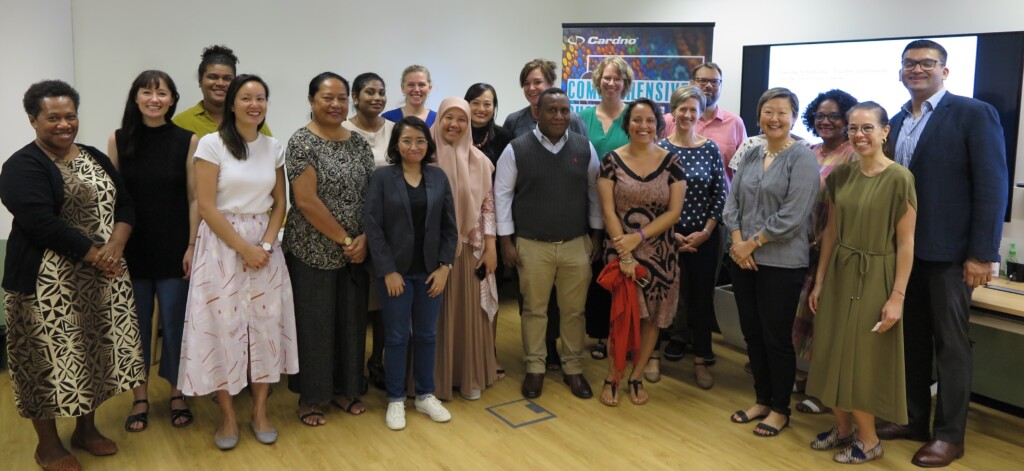Walking a tightrope: Navigating relationships and nurturing localisation
August 25, 2021

PC: Rob Rickman/FWF 2021
Part one of a series of blogs written by the Fund’s Board, Team and Cardno on insights into our journey towards an independent Fund.
By Joanne Choe and Mai Nguyen
Whilst the international development and humanitarian space has been transformed by the COVID-19 pandemic, grappling with the mass relocation of international personnel from country posts, initiatives like the Fiji Women’s Fund have continued, relatively uninterrupted, with minimal loss of momentum to its activities.
The proliferation of the term ‘localisation’ circulates in the development sphere; however, it has been a part of the Fund’s vocabulary from its design and inception more than five years ago. The Fiji Women’s Fund was designed to reach women in rural and remote areas and become a locally-led and sustainable entity – the first national women’s Fund in the Pacific – by the end of 2021. In other words, localisation was “baked in” to the design and establishment of the Fiji Women’s Fund from day one. I (Joanne) was working at DFAT at the time and helped conceive of, design, and establish the Fund. As happenstance allows, I have been able to continue to see the Fund flourish and provide support through my role at Cardno over the last few years.
Cardno has supported the Fund since its inception in 2017, as an initiative of Pacific Women Shaping Pacific Development, and has been progressively handing over operational and management functions to the local team in preparation for the Fund to operate as an independent, locally-registered organisation. Due to this clear localisation objective from the beginning, Cardno’s relationship with the Fiji Women’s Fund is unlike the typical managing contractor and program paradigm. As the program took shape, the Fund team led the work on the ground and developed procedures and strategies to support grant-making and capacity development; whereas Cardno’s role was to be in the engine room and hold down the fort operationally.
A measure of a development program’s success can be assessed by how impactful its outcomes are and the likelihood of these impacts being sustained in the future. The Fund in its inception and implementation embodies these measures and considerations. Success for Cardno in this instance clearly means working itself out of a job. From Cardno’s perspective, this was refreshingly new territory; and due to this architecture, rudimentary contract deliverables and decision making has been intentionally tailored to enable the Fund to be well-positioned to take on the operational function critical to complement its outstanding programmatic implementation to date. I (Mai) started working with the Fund 18 months ago and was drawn to the grassroots aspects of the program which is not always present in development programs.
The working relationship between Cardno and the Fund is inextricably guided and motivated by ensuring successful progress and achievement towards the Fund’s localisation timeline and goals. Over 18 months ago, the localisation agenda took shape, and a process was developed between Cardno and the Fund to outline the tasks and timeline in a Handover Plan. The division of tasks is one aspect of the Handover Plan; however, the achievements, setbacks, and challenges are mutually shared by both Cardno and the Fund.
“It took me several months to reconcile which role to play – the pragmatic Cardno representative putting things in their place in a systematic way that makes sense, or an empathetic development worker wanting to protect the vision of the Fund – not realising there doesn’t need to be one or the other, but a hybrid. These ‘hats’ aren’t mutually exclusive and can be harnessed at the same time. I think it is easy in international development to be binary in your approach, or mimic what has been done before. I became increasingly unafraid to trial new ways of troubleshooting and thinking with the Fiji team and cultivating a working relationship unashamed of asking questions.” – Mai Nguyen
The metaphor of a tightrope aptly describes Cardno’s participation in and management of the Fund’s localisation which accurately captures the element of risk, and also delicacy. Delicacy in maintaining open communication with staff, donors, and interested parties; delicacy in knowing the benefits and timing of when to handover functions to prevent potential complications or failure; and delicacy in managing expectations, both internally and externally.

Cardno team with a few of the Gender Programmes across the Pacific, including representatives of the Fund – Canberra 2020. PC James Broom
There was no blueprint that Cardno could adopt, modify, or learn from. This meant every component of handing over and supporting the Fund’s localisation was created to respond to information that was known or forecasted. The Handover Plan, despite allowing ample time for milestones, expectedly faced hurdles along the way in its implementation. For instance, “transferring human resources management”, which on paper 18-24 months ago was a mere dot point assigned to a deadline and person, has in practice translated to 11 sub-tasks assigned to Cardno, Fund personnel, and external consultants for support. It was at these junctures, both Cardno and the Fund underestimated the enormity of the responsibilities that were planned to be transferred to the local entity.
Localisation in its premise presumes locally-led leadership and management. For the Fund, it achieved this in grant management, capacity support and movement building, which it drove, owned, and executed exceptionally well from the beginning. The Fund is a pioneer in developing, piloting, and establishing a feminist grant-making process; from calls of interest, proposal development, contracting, and ongoing management including capacity support.
Walking the tightrope slowly and forging ahead has not been easy; notably, in breaking down each of the operational areas (finance, human resources, procurement, administration), seeing what applies for the local context, asserting the necessity and value for its adoption to the locally-registered entity, and revising timelines to account for ‘trial and error’, delays, the local registration process and the pandemic.
The team at the Fund has examined how to assume these responsibilities internally with a governance structure, whilst strengthening and elevating their important work in gender equality in Fiji into the future. Similarly, the team at Cardno had to make decisions on when and where best the Fund could take on more as the handover process commenced. Monthly handover meetings were introduced at the beginning of 2021 between Cardno and Fund personnel to provide an orderly status update of the progress of tasks.
The characterisation of ‘you know what you know’ could have meant a siloed, transactional basis of handing over between Cardno and the Fund. Building a bridge to understand motivations and non-negotiables and initiating dialogue to reconcile misunderstandings has been critical for the handover process. Having held the contractual obligations and management of the Fund’s deliverables to date, Cardno recognised the tasks at hand to implement an effective program. Whilst Cardno’s duty was to help establish systems, structures, policies and procedures, it was critical to appreciate the Fund’s successes thus far, not assume the ‘Cardno way’ would be mimicked by the Fund and appreciate how the Fund’s values needed to underpin the handover process, which as a result has been an authentic, dynamic and innovative way of working.
During the last 12 months, Cardno has incrementally transferred tasks over to the Fund to provide first-hand exposure and allow for any support where needed. For example, program procurements that were historically managed by Cardno, have been completely transferred to the Fund to manage and oversee. Due to Cardno’s feedback on these processes, the team at the Fund has learned from each procurement and incorporated these lessons in subsequent activities.
The relationship between Cardno and the Fund has evolved over the past four years, and its effectiveness lies in the willingness to adapt to changes, setbacks, and uncertainties of both parties. The relationship ‘works’ because no onus is placed on one entity to drive the localisation process; it is mutually shared and reinforced. This has led to efficient decision-making, strategic foresight, and mirrored troubleshooting. For instance, there has been congruency between Cardno and the Fund’s thinking and placements for technical personnel to support the Fund’s resource mobilisation, registration, personnel management, and upcoming donor due diligence assessments.
Being on the same page (most of the time!) is also aided by not having ‘big egos’ or ‘difficult personalities’ to navigate. The power dynamic is an equal one, based on mutual respect – which is unfortunately not always the case in international development. This has paved the way to recognise the strengths within the two teams and acknowledge opportunities for the Fund to take the lead on certain tasks.
The tightrope is becoming increasingly easier to walk on knowing the joint efforts of Cardno and the Fund are being recognised, with the Fund receiving its registration under Fiji’s Charitable Trust Act, cementing its Strategic vision for the next 3 years, and securing funding to continue its important work. It has also served as a basis for other Cardno programs to learn from in other localisation activities across the Asia Pacific.
Cardno is incredibly proud of what the Fund has achieved and is honoured to have been a part of this journey with the Fund. What makes it so incredible is that in the space of five years, not only has the Fund-supported hundreds of initiatives across Fiji that have meaningfully contributed to strengthening gender equality, but it has also established itself as a local entity that is about to become fully independent. That is the embodiment of sustainable development – something that we all strive to achieve in international development but so often fail to do. The Fund’s journey and experience proves that locally-led initiatives are best placed to achieve lasting social change – and instead of being unique the Fund’s approach and the journey should become the norm – Joanne Choe
“I’ve learned a lot through this process, a lot more than one can imagine or expect to in a formulaic ‘key performance indicator’ way. It stretched me personally and professionally, and I feel incredibly lucky to have had this exposure to working with such a dynamic and passionate team in Fiji. I am extremely proud of our joint efforts, knowing the challenges and external demands we have had to respond to. – Mai Nguyen
About the Authors
Joanne Choe is the Head of Program Quality and Gender at Cardno International Development. In this role, Jo supports Cardno’s development programs across the Asia Pacific to learn, adapt and engage in development effectiveness best practice, including gender equality and social inclusion. Jo has worked in international development for the past eighteen years, mostly in the Pacific region, including as head of DFAT’s development cooperation team in Fiji and supporting justice and subnational governance programs in Papua New Guinea. Jo is a Board Director and Deputy Chair of the International Development Contractors Community.
Mai Nguyen is the Cardno Contractor Representative for the Fiji Women’s Fund. Over the past 10 years, Mai has worked in the Asia-Pacific region focussing on capacity building, program and financial management, monitoring and evaluation and strategic planning in civil society organisations, INGOs and academic institutions. Mai has taught Development Studies at the University of Melbourne and has implemented DFAT and EU-funded programs in Myanmar, Laos, and Fiji in the areas of education, child and youth development, peacebuilding and human rights.
Recent blog
Crafting Canoes of Change in Fiji
July 21 2022
Reflections of a Pacific Feminist
November 29 2021

Leave a Reply